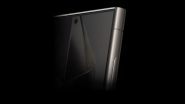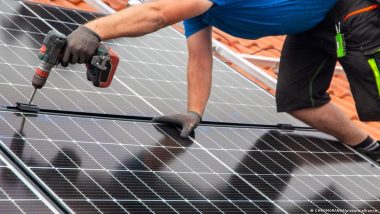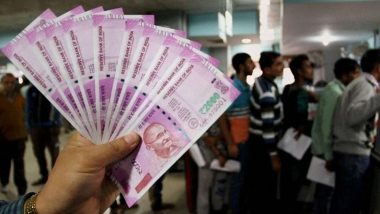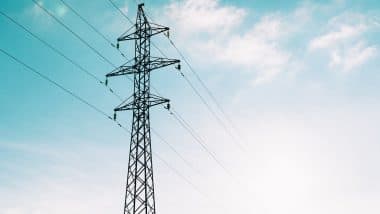The German government set aside hundreds of millions to help property owners with an electric car buy solar panels and a charging point. Some 33,000 people applied for the grants in just a few hours, draining the fund.The German government launched a new fund on Tuesday designed to assist people with their own homes and their own electric cars to install solar panels, a battery storage device and a charging point so that they could cleanly charge their cars at home each evening.
And by the early hours of Wednesday morning, demand had proved so great that the €300 million (roughly $315 million) fund was empty.
"As a result of the enormous interest and the high demand, the approved budgetary funds of €300 million for the calendar year 2023 are already exhausted," the government's KfW development bank said in a statement. "In total, roughly 33,000 applications were approved."
The bank's website crashed occasionally on Tuesday, apparently overburdened by visitors applying for the scheme.
Transport Minister Volker Wissing, of the pro-business FDP, spoke of "overwhelming demand" and said the subsidy scheme had obviously hit a nerve with the public.
What was the offer?
People with their own house or apartment, who either already owned or could demonstrate that they had ordered an electric vehicle, were eligible for up to €10,200 under the scheme.
That money would be used to help with the purchase and installation of solar panels, a battery storage device and a private charging station for their vehicle.
People given a grant then have two years to arrange the various purchases and installations; they can claim the money on completion.
People were only eligible for the full grant if they also agreed to allow for the drainage of their vehicle's battery in times of need. In other words, when parked, the car's battery could also serve as a small reserve either to bolster the electricity grid or to help power their home at times of peak demand.
No valid application refused
The program was intentionally operating on a first-come, first-served basis with no valid application refused, part of a bid to limit red tape and bureaucratic costs. Applicants were all likely to be relatively affluent in any case, given that they had to own their homes and an electric vehicle. Nevertheless, some criticized the scheme on this basis.
"Fundamentally, the principle should be fair allocation rather than first-come, first-served," said Stefan Gelbhaar, transport policy spokesman for the Greens. "Who has the fastest internet connection should not be the decisive factor, it should be a fair shake for everyone."
A spokesman for the German Transport Ministry argued, however, that it was just one part of a multi-pronged strategy.
Encouraging home charging using homegrown electricity would reduce the demand for public charging stations and also the burden on the German electricity grid, he said. He noted that other schemes to subsidize the construction of public charging points also existed.
Meanwhile, the ZDK, a federation of German car businesses, argued that the government's scheme had a "decisive structural flaw." It said making the scheme available to people who already used electric cars was a mistake and said the grants should have subsidized new car purchases as well.
"The federal government missed a chance here to bring additional electric cars onto the road," ZDK Vice President Thomas Peckruhn said. "In order to sensibly drive e-mobility and the production of photovoltaick capacities, the purchase of a new electric car should have been a subsidised element. Limiting it to solar panels, battery storage units and wall chargers doesn't go nearly far enough."
Subsidies for the purchase of new electric cars do already exist, however. As of January 1 next year, the German government plans to reduce them to €3,000, from €4,500 at present. Starting next year, only private purchasers will be eligible, not businesses and traders.
The government in Berlin tried to present these reductions as a win when announcing them this year, saying the changes reflected the increasing organic price competitiveness of electric cars and the rising demand among consumers.
What if I'm in Germany, would qualify, and hadn't heard about all this?
In that case, you can always plan to try to join the 2024 intake.
However, if this week's numbers are anything to go by, you'd better hurry when the time comes.
For the moment, €200 million is set aside for the same scheme next year, slightly less than was successfully claimed on Tuesday.
The precise start date for 2024 is not yet clear, but there's every chance it might also be the closing date.
That said, the KfW did say on Wednesday it anticipated that some successful applicants might change their mind and never complete the process and claim the money. In such cases, it said, the funds earmarked for them would be made available again.
msh/sms (AFP, dpa)
While you're here: Every Tuesday, DW editors round up what is happening in German politics and society. You can sign up here for the weekly email newsletter Berlin Briefing.
(The above story first appeared on LatestLY on Sep 28, 2023 01:40 AM IST. For more news and updates on politics, world, sports, entertainment and lifestyle, log on to our website latestly.com).













 Quickly
Quickly





















